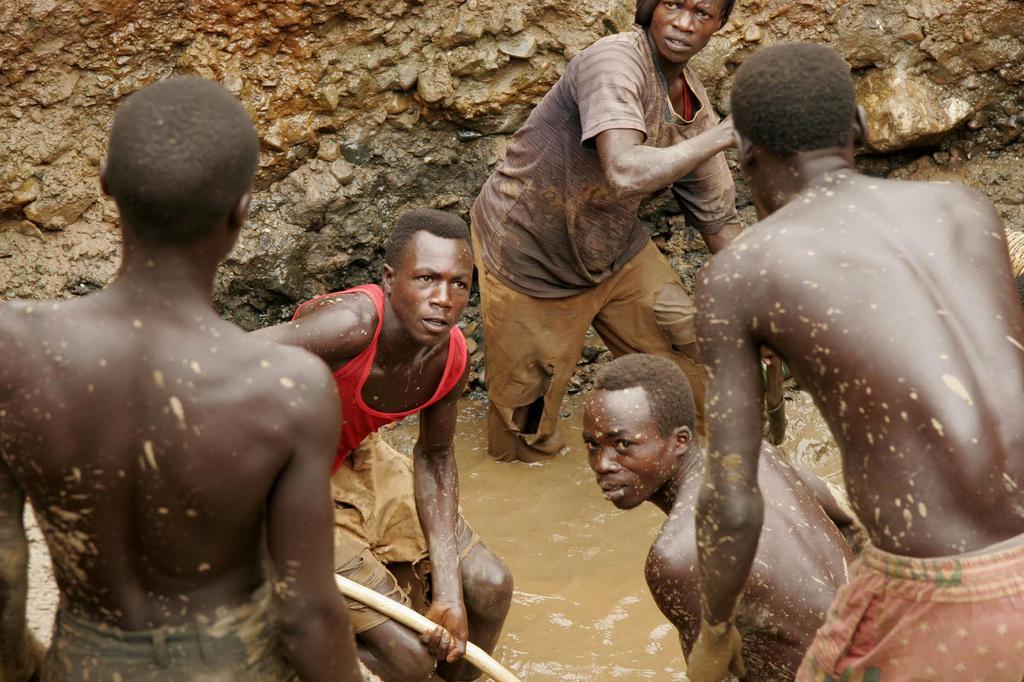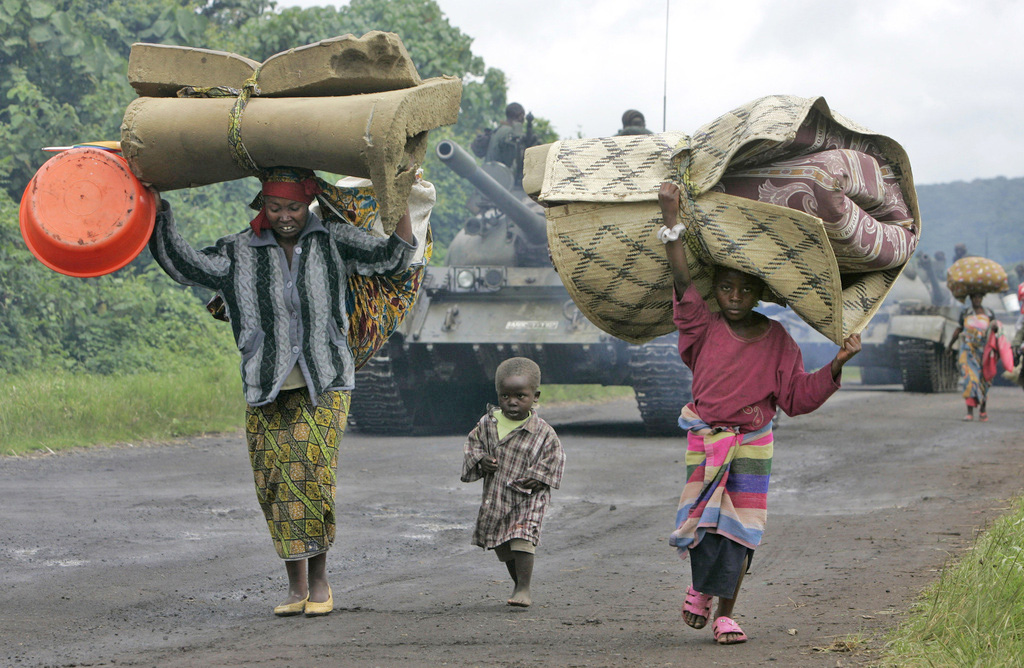Why does a country shun aid?

The Democratic Republic of Congo (DRC) has boycotted a United Nations conference in Geneva that reaped hundreds of millions of dollars to help its starving population. Imogen Foulkes listens to the emotional arguments on both sides.
It’s one o’clock, and I’m hurrying through the Palais des Nations’ long corridors towards Room XIX, a vast meeting room in the Palais’ more modern, less charming wing.
As I get closer, there is an enticing smell of food; rather distracting, because I’m on a deadline and hoping to get an interview for my story, so lunch will have to wait.
Outside Room XIX itself the source of the distraction is revealed: a vast buffet of hot and cold canapés, petits fours and mini eclairs. A UN sweetener, perhaps, for an event that had gone rather sour.
The assembled diplomats and senior aid officials emerging from Room XIX had gathered to raise money for what the UN says is a major, protracted humanitarian crisis in DRC, but without representation from DRC itself, whose government had decided to boycott the event.
It is unprecedented for an affected country to stay away from a UN pledging conference being held for its benefit, but that is what DRC decided to do, accusing the UN of exaggerating the crisis, and talking the country down.
Staggering levels of need
It is certainly true that the UN’s estimates for those in need in DRC are staggering: 13 million people, among them millions of children suffering acute malnutrition.
DRC’s problems are not new, aid agencies say, but they have got worse over the last year as instability and violence spread to the Kasai region, once viewed as the most peaceful and prosperous part of the vast country.
Jan Egeland, a senior UN advisor and general secretary of the Norwegian Refugee Council, told me he had been shocked at conditions when he visited a few weeks ago.
“I was not prepared for the scale of the suffering, frankly,” he said. “This is up there with Yemen and Syria in terms of the number of people in desperate need.”
“I met widows with five children. They saw their husband being killed by an armed group, their villages torched, and no one was there to help them.”
These are descriptions which humanitarian workers clearly hoped would stir the hearts and open the wallets of wealthy donor countries.
Level 3
Unfortunately, as the conference approached and more and more aid agencies pushed out material about DRC’s crisis, the government in Kinshasa began to show irritation. A particular grouse was the UN’s decision to class parts of DRC as suffering a “Level 3” crisis, the organisation’s most severe. Only Iraq, Syria and Yemen share that dubious honour.
“What drove people mad was the level of the humanitarian situation was raised to L3,” DRC’s ambassador to the UN in Geneva, Zénon Mukongo Ngay, told me.

More
Swiss pledge CHF12.5 million to Congo
“Level 3 is the worst of all levels, meaning DRC has been compared to countries where there is chaos, where the state has collapsed, where there is nothing working.”
And, he suggested, UN officials were out of touch with what was really happening in DRC.
“Sometimes people are just sitting in their offices in Geneva or New York, and they just get a telephone call, they are not on the ground. We have people everywhere.”
Image harming
DRC, which is preparing for elections later this year and is keen to attract investors for its vast mineral resources, is not at all happy to be portrayed as a humanitarian crisis zone, a country on the brink of failure whose survival is dependent on outside help.
It is not the first country, and will certainly not be the last, to be uncomfortable with the negative headlines that tend to accompany massive foreign aid. Haiti has suggested it is weary of a narrative which portrays it as unable to achieve anything on its own.
Other nations regularly refuse international assistance after a natural disaster: China and India have done so, the US did after Hurricane Katrina, Myanmar after Cyclone Nargis. Hindsight might suggest this was a mistake, but such decisions are generally made out of national pride and governments’ desire to demonstrate their capability to care for their own people.
Insensitive approach?
The United Nations is used, then, to dealing with governments who need to preserve the impression that they are in complete control, however difficult the situation. So was the appeal for DRC handled insensitively?
That’s a question I put to Jan Egeland. “I think not,” he said. “I think what the international community has done is ignore it really. There are 13 million people in need, this is an objective needs assessment. Since the Congolese are not coming to the Mediterranean, since they are not part of a Russia-US or Saudi-Iran battle [many analysts claim Saudi Arabia and Iran are fighting proxy wars in Yemen and Syria] they are being ignored really.”
Right up until the last minute UN officials had hoped Kinshasa would change its mind, pointing out that the UN had planned the pledging conference and agreed the level of need with DRC’s government back in January.
But when the conference began, DRC’s chair was empty. Mark Lowcock, the UN under secretary general for humanitarian affairs, clearly knew he had to smooth some ruffled feathers. His opening speech praised the “progress” DRC had made.
“Over the last 15 years, under the leadership of the Government, infrastructure in many major cities has improved,” he said.
“Access to education has increased, child mortality rates have fallen and immunisation rates have increased.”
Disappointing pledges
But DRC did not show up, and when Lowcock emerged to announce the results of the conference, no amount of canapés could sweeten the bitter truth.
Of the $1.8 billion (CHF1.73 billion) the UN had said it needed to fund its aid operation in DRC, just $528 million, less than a third, had been pledged.
And while the UN publicly insisted it had never expected to raise the full amount, privately there was big disappointment and concern about the future. One aid worker, speaking off the record, told me his agency was finding it increasingly difficult to work in DRC, and that a recent application to appoint a new country director had been refused by the government.
So what happens now? As with many other crises, the UN will have to struggle on with less than half the funding it says it needs for DRC. Behind the scenes a lot of work is going on to restore relations with Kinshasa.
The tragic irony is that the UN and DRC do agree on the fundamentals, just not on the precise figures: millions of people (but perhaps not 13 million) in the country need humanitarian aid. $528 million will not be enough to help them (although $1.8 billion might have been a trifle exaggerated.)
Meanwhile, Jan Egeland says “it’s too bad that the widow with five children has no attention to her suffering, because it is as bad as anywhere else in the world. It’s a disgrace really”.
You can follow Imogen Foulkes on twitter at @imogenfoulkes, and send her questions and suggestions for UN topics.

In compliance with the JTI standards
More: SWI swissinfo.ch certified by the Journalism Trust Initiative












You can find an overview of ongoing debates with our journalists here . Please join us!
If you want to start a conversation about a topic raised in this article or want to report factual errors, email us at english@swissinfo.ch.